Coleslaw is a classic side dish that is loved for its crunchy texture and tangy flavor. While coleslaw is commonly enjoyed fresh, canning coleslaw allows you to preserve this delicious dish for later use. In this article, we’ll explore how to make and can coleslaw, ensuring that you can enjoy this tasty side dish all year round.
What is Coleslaw?
Coleslaw, also known as slaw, is a salad made primarily with finely shredded cabbage and a dressing. The dressing can vary but typically includes ingredients such as mayonnaise, vinegar, sugar, and mustard. Coleslaw can also include other vegetables like carrots and onions for added flavor and texture.
History of Coleslaw
Coleslaw has a long history, with roots that can be traced back to ancient Rome. The modern version of coleslaw is believed to have originated in the Netherlands in the 18th century, where it was known as “koolsla,” which translates to “cabbage salad.” Dutch settlers brought coleslaw to America, where it quickly became a popular side dish, especially at barbecues and picnics.
Coleslaw Recipe for Canning Ingredients
To can coleslaw, you will need the following ingredients:
Slaw Ingredients
- 1 Medium Head of Cabbage
- 1 Large Carrot
- 1 Green Pepper
- 1 Small Onion
- 1 tsp. Salt
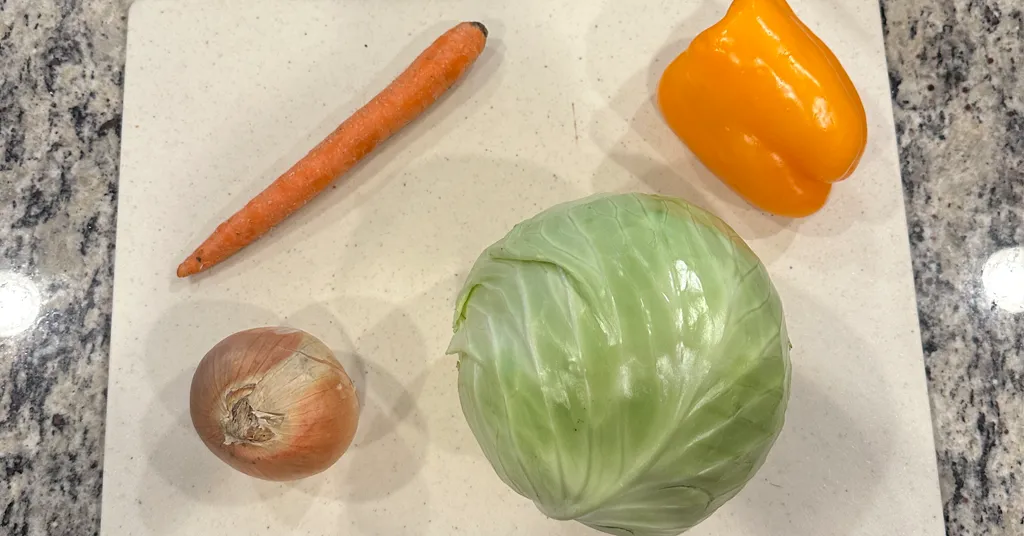
Syrup Ingredients
- 1 cup Vinegar (5% Acidity)
- 1/4 cup Water
- 2 cups Sugar
- 1 tsp Celery Seeds
- 1 tsp Mustard Seeds
Equipment Needed for Canning Coleslaw
You will need the following equipment to can coleslaw:
- Large Stainless Steel Pot
- Vegetable Peeler
- Food Processor (with shredder blade)
- Cutting Board
- Knife
- Measuring Cups
- Liquid Measuring Cups
- Measuring Spoons
- Glass Bowl
- Colander
- 1/2 Pint Canning Ladle
- Funnel
- Water Bath Canner or Steam Canner
- Jar Lifter
- Pint Size Canning Jars
- Lids
- Rings
- Headspace Measurer/Debubbler
Steps to Prepare Coleslaw for Canning
Step 1: Prepare the Jars
Clean jars and lids with warm soapy water. Ensure the jars do not have any chips or bubbles in the glass.
Step 2: Prepare the Vegetables
Wash and peel your carrot. Peel your onion. Wash cabbage under cold water, remove the outer large leaves, and cut cabbage into quarters and core.
Using a food processor in batches shred all your vegetables. Place them in a glass bowl and stir them to combine. Add the salt to the vegetables and toss well.
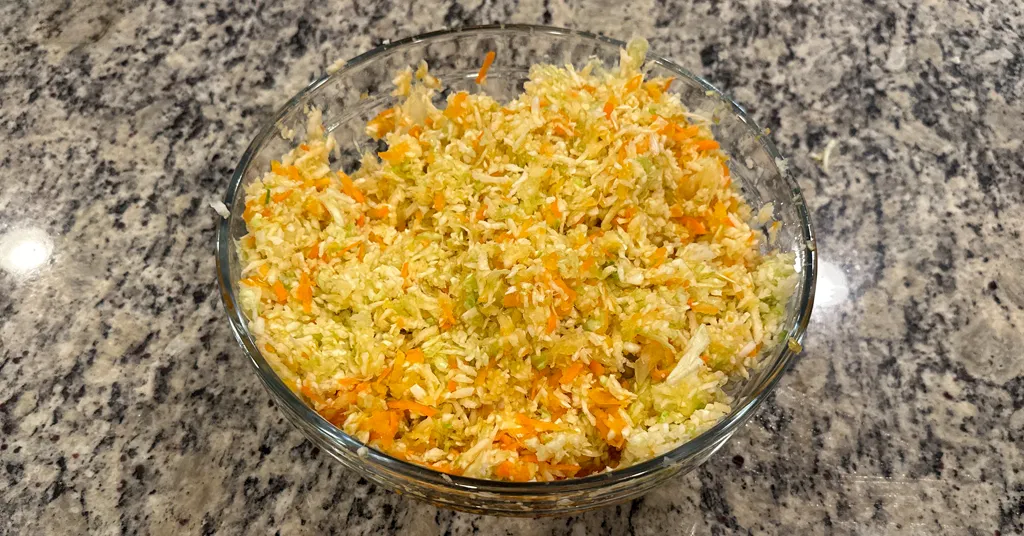
Let the vegetables stand for 1 hour (The salt will help remove some of the water from the vegetables.)
Using a colander drain the water from the vegetables.
Rinse vegetables thoroughly and drain well again to reduce the salt content.
Step 3: Prepare Your Canner
Using a Water Bath Canner:
Put your water bath canner on your stove. Add your canning rack to the water bath canner. Add your pint jars to the water bath canner. They will warm as you heat the water. Add enough water to cover jars with at least 2-3 inches of water. Start to bring your water to a boil.
Using a Steam Canner:
Put your steam canner on your stove. Add the steam canner rack to the bottom of the steam canner. Add the recommended amount of water to the steam canner according to the manufacturer. Add your pint jars to the steam canner. Put the lid on your steam canner and start your stove. The jars will warm as you heat your steam canner.
Step 4: Prepare the Syrup
In a large stainless steel pot, combine vinegar, water, sugar, celery seeds, and mustard seeds. Bring to a boil over medium-high heat, stirring frequently. Boil for 1 minute.
Cool syrup to room temperature.
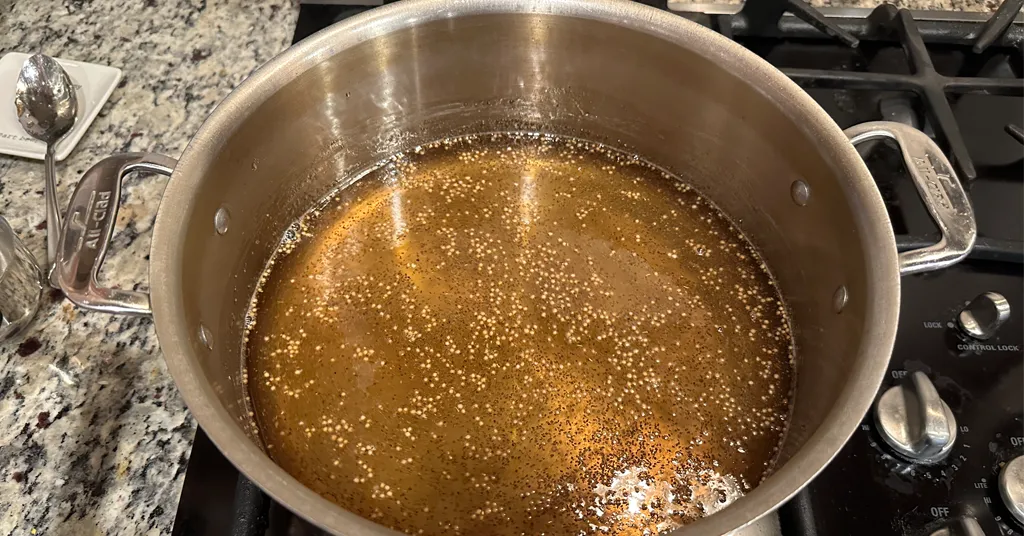
Step 5: Combine Vegetables and Brine
Add vegetables to cooked syrup and mix well.
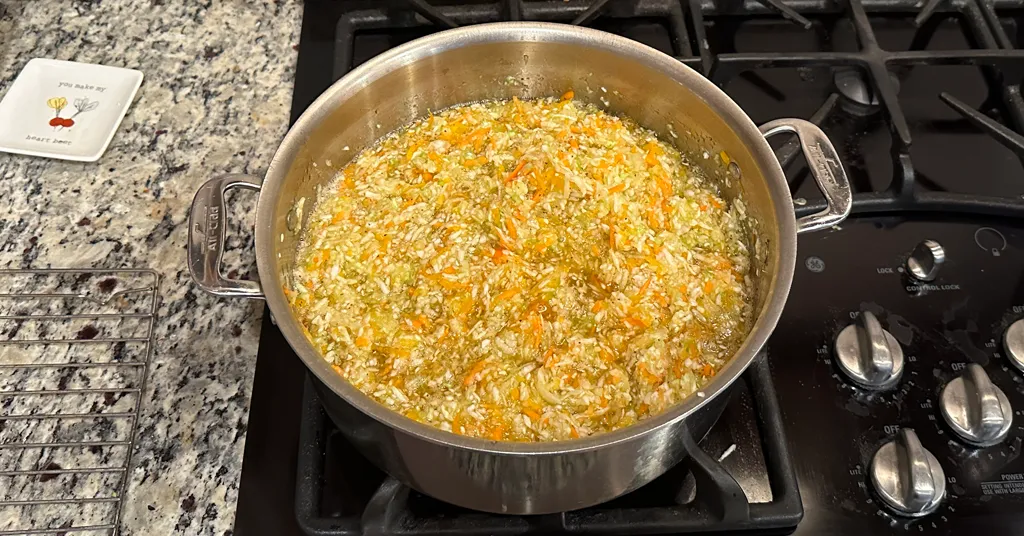
Step 6: Pack the Coleslaw
Once you have hot jars and the coleslaw mixture.
Water Bath Canner
Remove your jars from the water bath canner one at a time using your jar lifter. Dump the water out of the jar into your water bath canner to ensure there is still 2-3 inches of water above your jars.
Steam Canner
Remove the steam canner lid and remove your jars one at a time using your jar lifter.
Pack jars
Pack coleslaw into a hot pint jar, leaving a generous 1/2 inch (1 cm) headspace.
Ladle hot syrup into the jar to cover the vegetables, leaving 1/2 inch (1 cm) headspace. Use your headspace measurer to verify space.
Remove any air bubbles with your de-bubbler and adjust the headspace, if necessary, by adding more hot syrup.
Wipe the rim of the jar to ensure a good seal is made with the lid. Center the lid on the jar and add the band to fingertip tight. Put the jar back into the canner using your jar lifter.
Repeat until all jars are filled.
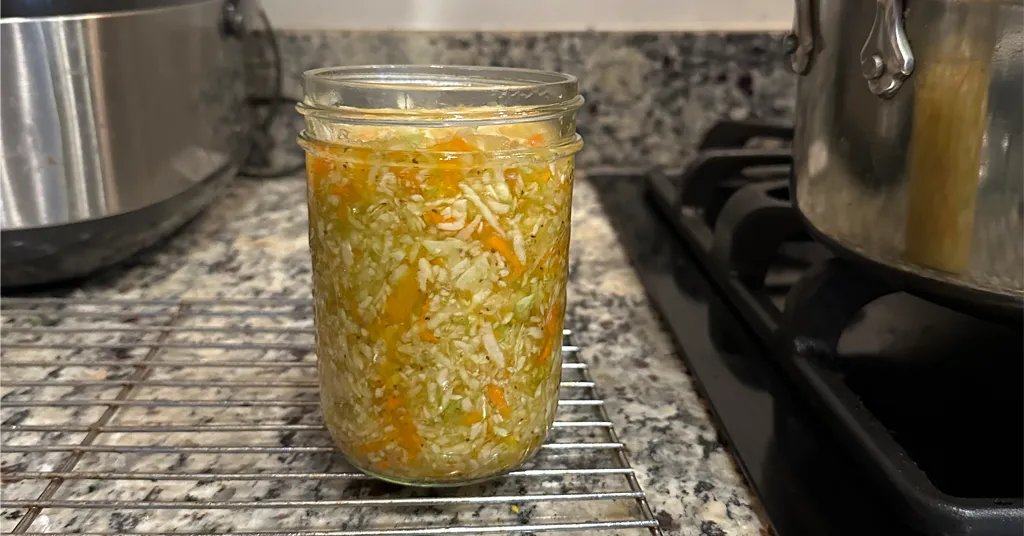
Step 7: Processing the Coleslaw
Water Bath Canner:
Lower the water bath canner rack into the boiling water. Ensure your jars are covered by at least 2 inches of water.
If your water is not boiling start your processing time when the water is boiling. Process pint jars for 15 minutes. Make sure to adjust your time for altitude.
Set a timer, it makes it much easier to make sure you process for the correct time. When your timer goes off turn off the heat and remove the canner lid.
Leave the jars in the water for 5 minutes.
Steam Canner:
Put the lid on the steam canner. Turn your stove on high until your steam canner water comes to a vigorous boil. Continue heating so the indicator is in the correct “Zone” per your altitude.
Start your processing time when the needle reaches the maximum point you have tested your steam canner to reach in your “Zone”.
Adjust the burner so that it maintains an even rolling boil throughout the entire processing time. Usually, this will be much lower than where it was set for the vigorous boil. If the top lid is lifting and/or spitting water from the edges this is an indication that you have the heat turned up too high. Slowly reduce the heat until this stops. Watch the indicator to ensure the temperature does not decrease.
The processing times for steam canning are the same as for water bath canning. Process pint jars for 15 minutes.
Make sure to adjust your time for altitude. Set a timer, it makes it much easier to make sure you process for the correct time.
When your timer goes off turn off the heat and let the canner stand for 5 minutes with the lid on before removing the jars. The lid MUST remain ON the canner during this time. This cool-down period is necessary to ensure the jar contents are properly processed.
Carefully remove the lid by tilting it away from you to avoid steam burns.
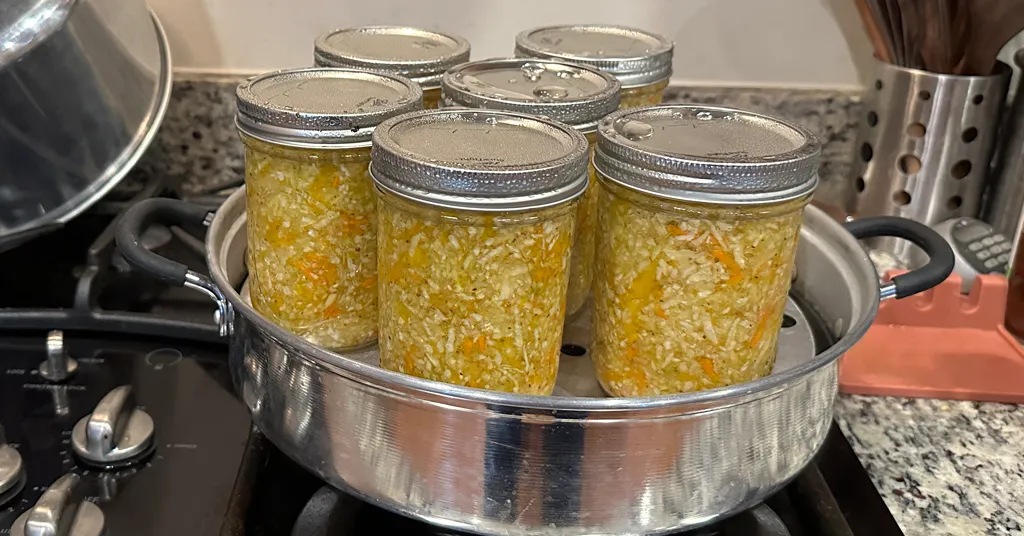
Freezing:
Put coleslaw into freezer containers and freeze. Leftovers may also be frozen.
Step 8: Cooling the Canned Coleslaw
Using your jar lifer carefully move the jars onto a wire rack or kitchen towel to allow them to cool. When moving the jars try not to tilt them to the side as this could affect the seal of the jars. Allow your jars to cool for 12-24 hours before handling.
Once cool, remove the canning rings from the jars. Wash your jars off to ensure no food residue is on the outside of the jar from processing. Label your jar with the name of the recipe and date. This will help you remember what recipe you used to can and the date will allow you to use the oldest canned goods first.
Safety Tips for Canning Coleslaw
- Always use fresh, high-quality ingredients for canning coleslaw.
- Ensure that your canning equipment is clean and in good condition.
- Follow proper canning procedures to prevent the growth of harmful bacteria.
Storing and Serving Canned Coleslaw
- Store canned coleslaw in a cool, dark place.
- Once opened, store any leftover coleslaw in the refrigerator and consume it within a few days.
- Serve canned coleslaw as a side dish or as a topping for sandwiches and burgers.
Canning or freezing coleslaw is a great way to preserve this classic side dish for future enjoyment. You can create delicious canned coleslaw that will last for months.
FAQs
- Can I use red cabbage for canning coleslaw?
- Yes, you can use red cabbage or a combination of red and green cabbage for a colorful coleslaw.
- How long does canned coleslaw last?
- Canned coleslaw can last for many years when processed using a safe and tested recipe and stored in a cool, dark place.
Recipe Card
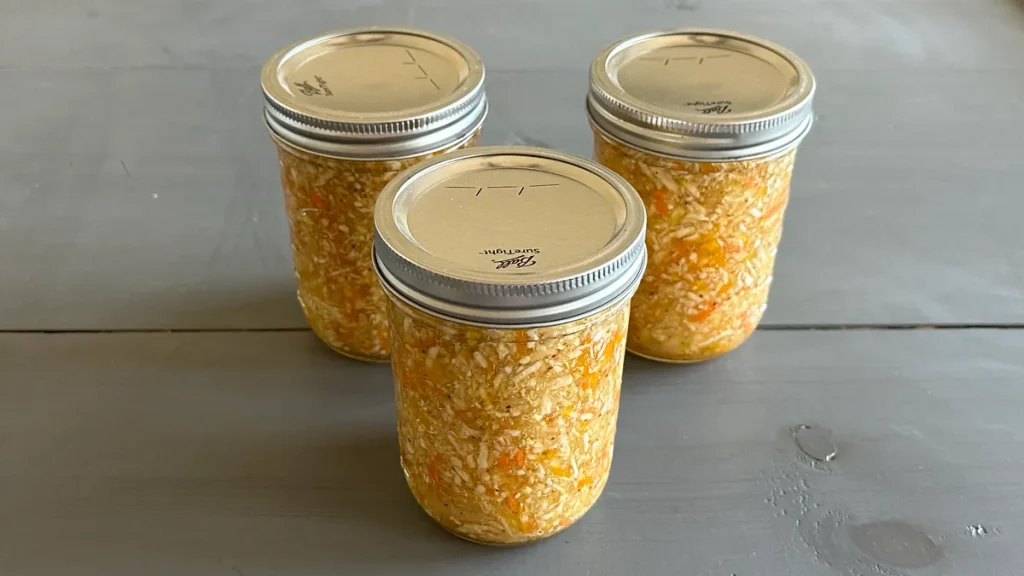
Coleslaw Recipe (Canning and Freezing)
Equipment
- Food Processor With Shreader blade
- Water Bath Canner Or Steam Canner
- Steam Canner or Water Bath Canner
Ingredients
Coleslaw Ingredients
- 1 Medium Head Cabbage
- 1 Large Carrot
- 1 Green Pepper
- 1 Small Onion
- 1 tsp Salt
Syrup Ingredients
- 1 cup White Vinegar 5% acidity
- 1/4 cup Water
- 2 cups sugar
- 1 tsp celery seeds
- 1 tsp mustard seeds
Want to Save this Recipe?
Instructions
- Clean jars and lids with warm soapy water. Ensure the jars do not have any chips or bubbles in the glass.
- Wash and peel your carrot. Peel your onion. Wash cabbage under cold water, remove the outer large leaves, and cut cabbage into quarters and core.
- Using a food processor in batches shred all your vegetables. Place them in a glass bowl and stir them to combine. Add the salt to the vegetables and toss well.
- Let the vegetables stand for 1 hour (The salt will help remove some of the water from the vegetables.)
- Using a colander drain the water from the vegetables.
- Rinse vegetables thoroughly and drain well again to reduce the salt content.
- Prepare your cannerUsing Water Bath Canner: Put your water bath canner on your stove. Add your canning rack to the water bath canner. Add your pint jars to the water bath canner. They will warm as you heat the water. Add enough water to cover jars with at least 2-3 inches of water. Start to bring your water to a boil.Using a Steam Canner: Put your steam canner on your stove. Add the steam canner rack to the bottom of the steam canner. Add the recommended amount of water to the steam canner according to the manufacturer. Add your pint jars to the steam canner. Put the lid on your steam canner and start your stove. The jars will warm as you heat your steam canner.
- In a large stainless steel pot, combine vinegar, water, sugar, celery seeds, and mustard seeds. Bring to a boil over medium-high heat, stirring frequently. Boil for 1 minute.
- Cool syrup to room temperature.
- Add vegetables to cooked syrup and mix well.
- Once you have hot jars and the coleslaw mixture. Water Bath Canner:Remove your jars from the water bath canner one at a time using your jar lifter. Dump the water out of the jar into your water bath canner to ensure there is still 2-3 inches of water above your jars.Steam Canner:Remove the steam canner lid and remove your jars one at a time using your jar lifter.
- Pack coleslaw into a hot pint jar, leaving a generous 1/2 inch (1 cm) headspace.
- Ladle hot syrup into the jar to cover the vegetables, leaving 1/2 inch (1 cm) headspace. Use your headspace measurer to verify space.
- Remove any air bubbles with your de-bubbler and adjust the headspace, if necessary, by adding more hot syrup.
- Wipe the rim of the jar to ensure a good seal is made with the lid. Center the lid on the jar and add the band to fingertip tight. Put the jar back into the canner using your jar lifter.
- Repeat until all jars are filled.
- ProcessingWater Bath Canner:Lower the water bath canner rack into the boiling water. Ensure your jars are covered by at least 2 inches of water.If your water is not boiling start your processing time when the water is boiling. Process pint jars for 15 minutes. Make sure to adjust your time for altitude.Set a timer, it makes it much easier to make sure you process for the correct time. When your timer goes off turn off the heat and remove the canner lid.Leave the jars in the water for 5 minutes.Steam Canner:Put the lid on the steam canner. Turn your stove on high until your steam canner water comes to a vigorous boil. Continue heating so the indicator is in the correct "Zone" per your altitude. Start your processing time when the needle reaches the maximum point you have tested your steam canner to reach in your "Zone".Adjust the burner so that it maintains an even rolling boil throughout the entire processing time. Usually, this will be much lower than where it was set for the vigorous boil. If the top lid is lifting and/or spitting water from the edges this is an indication that you have the heat turned up too high. Slowly reduce the heat until this stops. Watch the indicator to ensure the temperature does not decrease.The processing times for steam canning are the same as for water bath canning. Process pint jars for 15 minutes.Make sure to adjust your time for altitude. Set a timer, it makes it much easier to make sure you process for the correct time.When your timer goes off turn off the heat and let the canner stand for 5 minutes with the lid on before removing the jars. The lid MUST remain ON the canner during this time. This cool-down period is necessary to ensure the jar contents are properly processed.Carefully remove the lid by tilting it away from you to avoid steam burns.Freezing:Put coleslaw into freezer containers and freeze. Leftovers may also be frozen.
- Using your jar lifer carefully move the jars onto a wire rack or kitchen towel to allow them to cool. When moving the jars try not to tilt them to the side as this could affect the seal of the jars. Allow your jars to cool for 12-24 hours before handling.
- Once cool, remove the canning rings from the jars. Wash your jars off to ensure no food residue is on the outside of the jar from processing. Label your jar with the name of the recipe and date. This will help you remember what recipe you used to can and the date will allow you to use the oldest canned goods first.

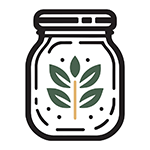
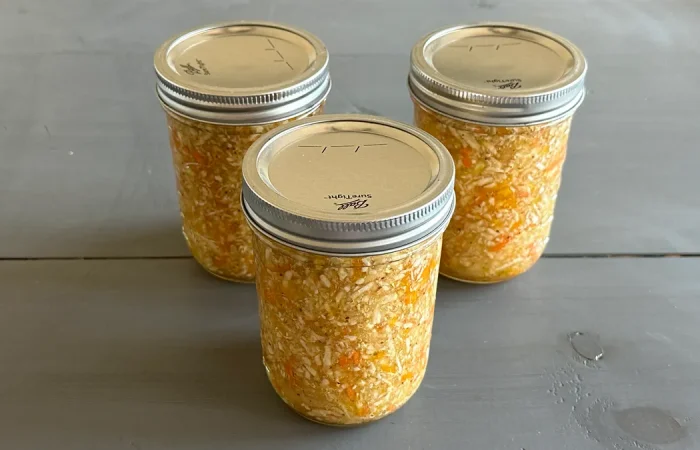
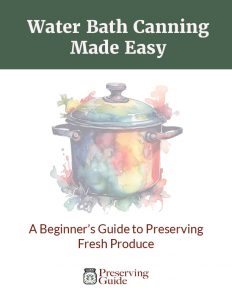


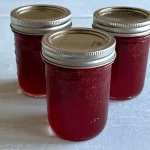
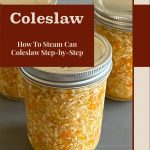
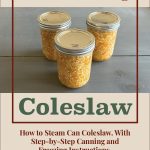
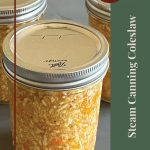
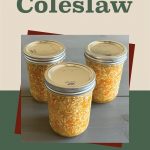
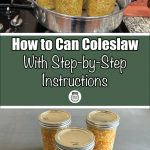
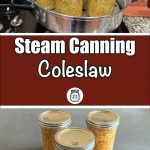
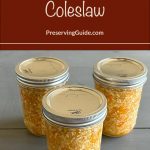
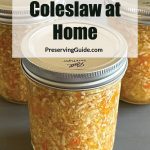
Curious… I make coleslaw with oil and vinegar. I am assuming I wouldn’t be able to do this with this recipe… Could I just use water and vinegar, no sugar, then add the oil after opening?
Natasha – If you follow this recipe you can add your oil after opening the jar. I did some research on your sugar question. From the University of California: Sugar in pickling is used to balance the tartness of the vinegar. Although the sugar can be eliminated from pickle recipes, the pickles are likely to be too sour. Note: Under no circumstances should the amount of vinegar be decreased or diluted to compensate for less sugar. Vinegar provides a certain level of acidity that is essential for safe pickling. https://ucanr.edu/sites/fresnonutrition/files/14351.pdf. The sugar also adds volume to the pickling solution so you may need to add additional vinegar to cover the solid food pieces in the jars for canning.